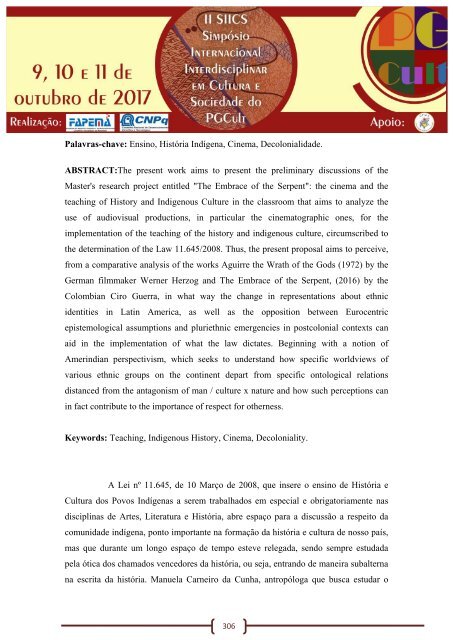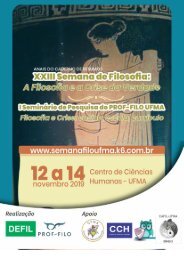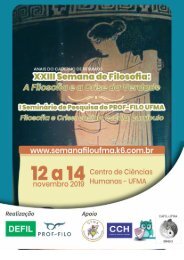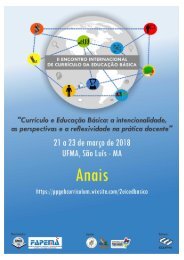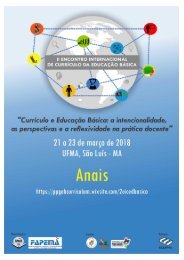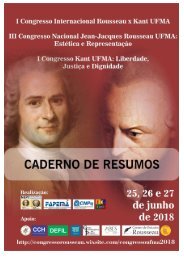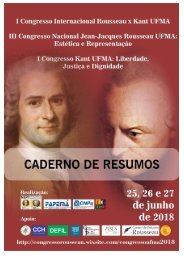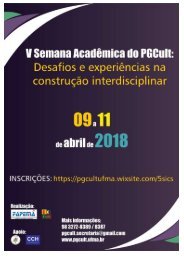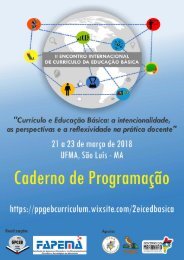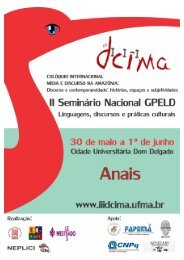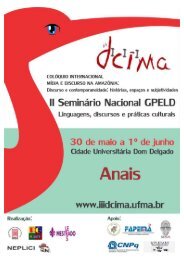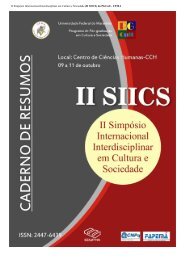Attention! Your ePaper is waiting for publication!
By publishing your document, the content will be optimally indexed by Google via AI and sorted into the right category for over 500 million ePaper readers on YUMPU.
This will ensure high visibility and many readers!

Your ePaper is now published and live on YUMPU!
You can find your publication here:
Share your interactive ePaper on all platforms and on your website with our embed function

Create successful ePaper yourself
Turn your PDF publications into a flip-book with our unique Google optimized e-Paper software.
Palavras-chave: Ensino, História Indígena, Cinema, Decolonialidade.<br />
ABSTRACT:The present work aims to present the preliminary discussions of the<br />
Master's research project entitled "The Embrace of the Serpent": the cinema and the<br />
teaching of History and Indigenous Culture in the classroom that aims to analyze the<br />
use of audiovisual productions, in particular the cinematographic ones, for the<br />
implementation of the teaching of the history and indigenous culture, circumscribed to<br />
the determination of the Law 11.645/2008. Thus, the present proposal aims to perceive,<br />
from a comparative analysis of the works Aguirre the Wrath of the Gods (1972) by the<br />
German filmmaker Werner Herzog and The Embrace of the Serpent, (2016) by the<br />
Colombian Ciro Guerra, in what way the change in representations about ethnic<br />
identities in Latin America, as well as the opposition between Eurocentric<br />
epistemological assumptions and pluriethnic emergencies in postcolonial contexts can<br />
aid in the implementation of what the law dict<strong>ate</strong>s. Beginning with a notion of<br />
Amerindian perspectivism, which seeks to understand how specific worldviews of<br />
various ethnic groups on the continent depart from specific ontological relations<br />
distanced from the antagonism of man / culture x nature and how such perceptions can<br />
in fact contribute to the importance of respect for otherness.<br />
Keywords: Teaching, Indigenous History, Cinema, Decoloniality.<br />
A Lei nº 11.645, de 10 Março de 2008, que insere o ensino de História e<br />
Cultura dos Povos Indígenas a serem trabalhados em especial e obrigatoriamente nas<br />
disciplinas de Artes, Literatura e História, abre espaço para a discussão a respeito da<br />
comunidade indígena, ponto importante na formação da história e cultura de nosso país,<br />
mas que durante um longo espaço de tempo esteve relegada, sendo sempre estudada<br />
pela ótica dos chamados vencedores da história, ou seja, entrando de maneira subalterna<br />
na escrita da história. Manuela Carneiro da Cunha, antropóloga que busca estudar o<br />
306
Palavras-chave: Ensino, História Indígena, Cinema, Decolonialidade. ABSTRACT:The present work aims to present the preliminary discussions of the Master's research project entitled "The Embrace of the Serpent": the cinema and the teaching of History and Indigenous Culture in the classroom that aims to analyze the use of audiovisual productions, in particular the cinematographic ones, for the implementation of the teaching of the history and indigenous culture, circumscribed to the determination of the Law 11.645/2008. Thus, the present proposal aims to perceive, from a comparative analysis of the works Aguirre the Wrath of the Gods (1972) by the German filmmaker Werner Herzog and The Embrace of the Serpent, (2016) by the Colombian Ciro Guerra, in what way the change in representations about ethnic identities in Latin America, as well as the opposition between Eurocentric epistemological assumptions and pluriethnic emergencies in postcolonial contexts can aid in the implementation of what the law dict<strong>ate</strong>s. Beginning with a notion of Amerindian perspectivism, which seeks to understand how specific worldviews of various ethnic groups on the continent depart from specific ontological relations distanced from the antagonism of man / culture x nature and how such perceptions can in fact contribute to the importance of respect for otherness. Keywords: Teaching, Indigenous History, Cinema, Decoloniality. A Lei nº 11.645, de 10 Março de 2008, que insere o ensino de História e Cultura dos Povos Indígenas a serem trabalhados em especial e obrigatoriamente nas disciplinas de Artes, Literatura e História, abre espaço para a discussão a respeito da comunidade indígena, ponto importante na formação da história e cultura de nosso país, mas que durante um longo espaço de tempo esteve relegada, sendo sempre estudada pela ótica dos chamados vencedores da história, ou seja, entrando de maneira subalterna na escrita da história. Manuela Carneiro da Cunha, antropóloga que busca estudar o 306
sujeito indígena por uma outra perspectiva afirma que “a História do Brasil, a canônica, começa invariavelmente pelo ‘descobrimento’. São os ‘descobridores’ que a inauguram e conferem aos gentios uma entrada – de serviço – no grande curso da História” (CUNHA, 2012, p. 08). Estuda-se, comumente, a história das populações nativas sempre após 1492, como se antes estes povos não possuíssem história ou qualquer tipo de produção cultural ou m<strong>ate</strong>rial de maior importância e destaque. Outra questão ainda mais grave é que a representação que encontramos das comunidades indígenas nos livros didáticos e nas escolas é de povos que estão estáticos, que não possuem uma cultura dinâmica, sendo comumente representados a partir de estereótipos e generalizações como se a cultura indígena não tivesse sofrido nenhuma modificação no processo histórico, limitando e homogeneizando inúmeras e diversificadas expressões sociais a uma única matriz de leitura referencial. Outra representação preocupante que se faz do índio na história é como mera vítima do processo de colonização. Não se nega aqui a extrema violência a que esses povos foram submetidos no processo de implementação do projeto colonial: violências físicas, como enfrentamentos diretos e desiguais, doenças, escravidão e etc; e violências simbólicas como mudanças no regime de trabalho, estrutura social e religiosa. Essas modificações forçaram uma reconfiguração na cultura indígena, mas isto não implica que estes povos tenham desaparecido, ou não possuam uma identidade própria. Janice Theodoro (1992) afirma assim perceber que as culturas indígenas são “viventes” e não “sobreviventes” no processo histórico (p. 64). Dessa forma busca-se através do presente trabalho analisar o uso das ferramentas metodológicas audiovisuais, em especial as produções cinematográficas ficcionais, para trabalhar o ensino da história e cultura indígena, circunscrita à determinação da Lei 11.645/2008, buscando dessa forma fomentar a abordagem da perspectiva intercultural e humanística de valorização da diversidade e da pluralidade cultural e étnica da qual é fruto nossa própria sociedade. 307
- Page 1 and 2:
JOÃO BATISTA BOTTENTUIT JUNIOR LUC
- Page 3 and 4:
COMISSÃO CIENTÍFICA Profª Drª C
- Page 5 and 6:
Homepage: https://pgcultufma.wixsit
- Page 7 and 8:
ARTE E ESTÉTICA INDÍGENA NO MARAN
- Page 9 and 10:
PERCEPÇÕES DE FAMILIARES EM RELA
- Page 11 and 12:
O DESENVOLVIMENTO DA LINGUAGEM DA C
- Page 13 and 14:
O RACISMO NAS REDES SOCIAIS: uma an
- Page 15 and 16:
A BIBLIOTECA E A INFORMAÇÃO ORGAN
- Page 17 and 18:
communicators, musicians, social re
- Page 19 and 20:
Seguindo as atividades, foram consu
- Page 21 and 22:
2.2Padrão de Descrição da Inform
- Page 23 and 24:
sm (lat sonu) 1 Tudo o que soa ou i
- Page 25 and 26:
Quanto aos problemas que esse tipo
- Page 27 and 28:
Outro ponto a ser destacado na desc
- Page 29 and 30:
6.5 Área da descrição física
- Page 31 and 32:
-6.7B9. Publicação, distribuiçã
- Page 33 and 34:
5 CONSIDERAÇÕES FINAIS Utilizando
- Page 35 and 36:
A EFETIVAÇÃO DO SISTEMA EDUCACION
- Page 37 and 38:
person, taking into consideration t
- Page 39 and 40:
Nesse contexto, torna-se oportuno m
- Page 41 and 42:
existência do direito à educaçã
- Page 43 and 44:
Artigo 24 Educação 1. Os Estados
- Page 45 and 46:
Maranhão, já foi enfrentada, algu
- Page 47 and 48:
V. As instituições particulares d
- Page 49 and 50:
CONCLUSÃO A leitura e análise dos
- Page 51 and 52:
TRIBUNAL DE JUSTIÇA DO ESTADO DO M
- Page 53 and 54:
educacional, nessa seara, pouco ou
- Page 55 and 56:
A educação ambiental deve ser um
- Page 57 and 58:
cultural desses povos. A república
- Page 59 and 60:
5º). Certamente, o que interessava
- Page 61 and 62:
OBJETIVOS GERAIS A preservação do
- Page 63 and 64:
para a construção do meio ambient
- Page 65 and 66:
ambiental. Ao longo das diversas ca
- Page 67 and 68:
A lei de educação ambiental nº 9
- Page 69 and 70:
A educação ambiental é uma ferra
- Page 71 and 72:
égide da tutela por parte da Uniã
- Page 73 and 74:
Art. 2º - A Política Nacional do
- Page 75 and 76:
interdependência aponta para a lig
- Page 77 and 78:
Podemos afirmar que as diversas com
- Page 79 and 80:
sua efetividade totalmente posterga
- Page 81 and 82:
ORGANIZAÇÃO DAS NAÇÕES UNIDAS -
- Page 83 and 84:
ABSTRACT: This article aims to desc
- Page 85 and 86:
deapropriação e de produção de
- Page 87 and 88:
Partindo do pressuposto de que mant
- Page 89 and 90:
Com efeito, a web 2.0, eventualment
- Page 91 and 92:
3. PLANEJAMENTO INTERDISCIPLAR COM
- Page 93 and 94:
objetivas para que o aluno aplique
- Page 95 and 96:
um programa de pós-graduação int
- Page 97 and 98:
Figura 1 - Página Inicial da timel
- Page 99 and 100:
Figura 05: Publicação no grupo da
- Page 101 and 102:
5. CONSIDERAÇÕES FINAIS A decisã
- Page 103 and 104:
SANTOS, F. C. dos; CYPRANO, C.P. Re
- Page 105 and 106:
municipal e outra à rede privada.
- Page 107 and 108:
experimentações levaram-no ao des
- Page 109 and 110:
os saberes e as práticas dos profi
- Page 111 and 112:
as visitas aconteciam nas quartas e
- Page 113 and 114:
Diante do exposto, cabe apontar que
- Page 115 and 116:
Já a docente P2 apenas citou ser d
- Page 117 and 118:
esultados já apresentados no desen
- Page 119 and 120:
público, mesmo as docentes que pos
- Page 121 and 122:
https://www.brain4child.com.br/neur
- Page 123 and 124:
A PRÁXIS-EDUCATIVA ROUSSEAUNIA E O
- Page 125 and 126:
de estranhamento e de solidão meto
- Page 127 and 128:
de filosofia em outro curso superio
- Page 129 and 130:
da interdisciplinaridade. Da mesma
- Page 131 and 132:
A formação do cidadão torna-se u
- Page 133 and 134:
Terceiro, o legislador deve conhece
- Page 135 and 136:
inserção da Filosofia nos ensinos
- Page 137 and 138:
NAVIA, Ricardo. Ensino médio de fi
- Page 139 and 140:
cinematographic machinery available
- Page 141 and 142:
Tal experiência, segundo o documen
- Page 143 and 144:
paralelo com a “Exibição da Gra
- Page 145 and 146:
que prevê, por exemplo, a proibiç
- Page 147 and 148:
sorridentes de componentes anônimo
- Page 149 and 150:
aperfeiçoaria as reformas consegui
- Page 151 and 152:
em outra época. As grotescas exper
- Page 153 and 154:
HITLER, Adolf. Mein Kampf. Disponí
- Page 155 and 156:
contexto da educação especial/inc
- Page 157 and 158:
e/ou com necessidades educacionais
- Page 159 and 160:
RESULTADOS E DISCUSSÕES A seguir,
- Page 161 and 162:
Nesse sentido, a pedagogia possui c
- Page 163 and 164:
No contexto, faz-se importante ress
- Page 165 and 166:
No contexto, importante lembrar o P
- Page 167 and 168:
as instituições educacionais deve
- Page 169 and 170:
A RELAÇÃO DA PRODUÇÃO ARTESANAL
- Page 171 and 172:
learning usually takes place in the
- Page 173 and 174:
Patrocínio (2015), a partir de Pap
- Page 175 and 176:
Apontados os conceitos e definiçõ
- Page 177 and 178:
contemporâneo dentro de seu contex
- Page 179 and 180:
tradicionais. As informações fora
- Page 181 and 182:
endeiras começassem a desenvolver
- Page 183 and 184:
Figura : Escala Virtuosa do Design
- Page 185 and 186:
para que as comunidades cheguem ao
- Page 187 and 188:
A RELEVÂNCIA DA INCLUSÃO DE CRIAN
- Page 189 and 190:
the development of children with an
- Page 191 and 192:
preservados, sendo tratado como par
- Page 193 and 194:
METODOLOGIA Realizou-se uma pesquis
- Page 195 and 196:
No contexto, o Referencial Curricul
- Page 197 and 198:
no brincar que os valores, habilida
- Page 199 and 200:
Os relatos e as observações reali
- Page 201 and 202:
Diante das considerações referida
- Page 203 and 204:
RICHARDSON, Roberto Jarry. Pesquisa
- Page 205 and 206:
necessidades educacionais específi
- Page 207 and 208:
methodologies suitable to different
- Page 209 and 210:
Sendo assim, a perspectiva da inclu
- Page 211 and 212:
Os dados apresentados foram levanta
- Page 213 and 214:
Diante dos dados, percebe-se que a
- Page 215 and 216:
outro, apenas em Pedagogia, sendo o
- Page 217 and 218:
seu plano de aula sem nenhuma orien
- Page 219 and 220:
Especial, 6 professoras informaram
- Page 221 and 222:
alimentação, locomoção, entre o
- Page 223 and 224:
teve sua porta arrombada, armários
- Page 225 and 226:
Necessário refletir, criticamente,
- Page 227 and 228:
. Acesso em: 2 mar. 2017. ______. D
- Page 229 and 230:
Trabalho docente. ABSTRACT: This pa
- Page 231 and 232:
educação que atenda suas necessid
- Page 233 and 234:
O fim da escravidão não significo
- Page 235 and 236:
Na literatura europeia um dos grand
- Page 237 and 238:
4 CONSIDERAÇÕES FINAIS Entendemos
- Page 239 and 240:
CUNHA, Maria Antonieta Antunes. Lit
- Page 241 and 242:
ARTE E ESTÉTICA INDÍGENA NO MARAN
- Page 243 and 244:
e Velthem (2007), além de apresent
- Page 245 and 246:
forçando o exílio para uma reserv
- Page 247 and 248:
sobre os seus corpos. Portanto, par
- Page 249 and 250:
moços estavam proibidos de dormir
- Page 251 and 252:
REFERÊNCIAS COLBY e DENNETT, Seja
- Page 253 and 254:
INTRODUÇÃO A produção de materi
- Page 255 and 256: ORNAMENTOS PLUMÁRIOS A complexidad
- Page 257 and 258: F 4Museu do Índio - N 5422. Vinhet
- Page 259 and 260: ARTESÃS CRIATIVAS: processo de cri
- Page 261 and 262: designer not as a centralizing agen
- Page 263 and 264: vinho da juçara. Além do vinho, o
- Page 265 and 266: Figura 2: Processos de beneficiamen
- Page 267 and 268: Diante desse contexto, utilizou-se
- Page 269 and 270: criativo a elaboração desses escr
- Page 271 and 272: Em seguida partiu-se para a escolha
- Page 273 and 274: Durante a oficina, se foi passado p
- Page 275 and 276: figura icônica deste, ganhando o a
- Page 277 and 278: simbolizar a dança da índia que o
- Page 279 and 280: Mediante os resultados obtidos, per
- Page 281 and 282: COMUNICAÇÃO, EDUCAÇÃO E TECNOLO
- Page 283 and 284: of content (text, images, videos, a
- Page 285 and 286: além da Educação, essas mudança
- Page 287 and 288: Na próxima seção explicita-se o
- Page 289 and 290: A convergência entre linguagem esc
- Page 291 and 292: uma conexão leva a outras conexõe
- Page 293 and 294: 3.2 Etapas de produção de uma Nar
- Page 295 and 296: 4 NARRATIVAS HIPERTEXTUAIS COMO FER
- Page 297 and 298: epresentações do conhecimento par
- Page 299 and 300: REFERÊNCIAS AQUINO, M. C. Um mapea
- Page 301 and 302: JOYCE, Michael. Sustituyendo al aut
- Page 303 and 304: %20digital%20natives,%2digital%20im
- Page 305: DE AGUIRRE A KARAMAKATE: uma leitur
- Page 309 and 310: Com esse intuito, e pensando a pró
- Page 311 and 312: mesma medida, o registro cinematogr
- Page 313 and 314: A obra do diretor alemão Werner He
- Page 315 and 316: nativo a partir das tradicionais re
- Page 317 and 318: imersão na perspectiva da experiê
- Page 319 and 320: idiossincrasias dos diversos grupos
- Page 321 and 322: DE VENTO EM POPA: práticas e saber
- Page 323 and 324: suggestions of succession the tradi
- Page 325 and 326: Outro quesito a ser mencionado sobr
- Page 327 and 328: Fonte: Elaborado pela autora Paula
- Page 329 and 330: para serem acomodadas em um mezanin
- Page 331 and 332: A tecnologia, para Zé Moraes, é b
- Page 333 and 334: porque muitas vezes são depositár
- Page 335 and 336: Cutia manifestou um desejo de que h
- Page 337 and 338: Os mesmos procedimentos anteriores
- Page 339 and 340: REFERÊNCIAS ALMEIDA, Alfredo Wagne
- Page 341 and 342: DISCURSOS DE PROFESSORES DE EDUCAÇ
- Page 343 and 344: ABSTRACT: The body is a structure t
- Page 345 and 346: O corpo é objeto de muitos investi
- Page 347 and 348: lógica da pesquisa quantitativa n
- Page 349 and 350: cultural tem como concepção princ
- Page 351 and 352: investigativa da pesquisa qualitati
- Page 353 and 354: organização do material qualitati
- Page 355 and 356: 3.1 O corpo como biologia A categor
- Page 357 and 358:
ambiente, com os sujeitos, com a so
- Page 359 and 360:
O sistema nervoso ganha status de e
- Page 361 and 362:
A visão biologicista limita a perc
- Page 363 and 364:
importante. Mas, não é só essa r
- Page 365 and 366:
Como podemos perceber, discutir sob
- Page 367 and 368:
diversas situações, inclusive, em
- Page 369 and 370:
3.5.1 “Uma infinidade de temas s
- Page 371 and 372:
culturais, conceitos, explicações
- Page 373 and 374:
captura da subjetividade pela seria
- Page 375 and 376:
3.6 Metodologias de ensino na discu
- Page 377 and 378:
No entanto, mesmo com essa explíci
- Page 379 and 380:
limita, padroniza, enquadra e ester
- Page 381 and 382:
GONÇALVES, M. A. S. Sentir, pensar
- Page 383 and 384:
DISCURSOS SOBRE O CORPO HUMANO EM L
- Page 385 and 386:
from the theoretical-methodological
- Page 387 and 388:
assuntos ligados á saúde, ao corp
- Page 389 and 390:
O corpo compreendido como biológic
- Page 391 and 392:
Figuras 7, 8 e 9: Representações
- Page 393 and 394:
como no trecho de Silva: “A Saúd
- Page 395 and 396:
Figura 19: Representação da Subca
- Page 397 and 398:
jovens ou inocentes daquilo que já
- Page 399 and 400:
motivada por uma necessidade de ser
- Page 401 and 402:
GOELLNER, Silvana Vilodre. A educa
- Page 403 and 404:
official national and international
- Page 405 and 406:
sua manifestação mais típica, é
- Page 407 and 408:
por meio dos quais se exerce a domi
- Page 409 and 410:
Coelho (2009) destaca os princípio
- Page 411 and 412:
Os documentos normativos para a esc
- Page 413 and 414:
para os povos indígenas, conforme
- Page 415 and 416:
educacional produz e dissemina idei
- Page 417 and 418:
COHN, Clarice. A cultura nas escola
- Page 419 and 420:
EJA: os desafios encontrados e a im
- Page 421 and 422:
“Hoje sabemos do valor da aprendi
- Page 423 and 424:
metodologias compatíveis com a for
- Page 425 and 426:
Gadotti e Romão (2001) defendem qu
- Page 427 and 428:
conteúdos metodológicos e avalia
- Page 429 and 430:
Pesquisador. Porto Alegre: Mediaç
- Page 431 and 432:
Palavras-chave: EJA. Ensino. Histó
- Page 433 and 434:
É importante que o Ensino de Hist
- Page 435 and 436:
vários retrocessos que se perpetua
- Page 437 and 438:
2. Metodologia e Procedimentos A pe
- Page 439 and 440:
GUEDES, L. F. A leitura no universo
- Page 441 and 442:
espaços pedagógicos com crianças
- Page 443 and 444:
Independente da forma que sejam con
- Page 445 and 446:
que incide sobretudo no plano indiv
- Page 447 and 448:
ompimento com a estrutura reproduto
- Page 449 and 450:
conforme algumas pesquisas constata
- Page 451 and 452:
concepções. Nesse contexto, além
- Page 453 and 454:
Sabemos que na etapa da vida refere
- Page 455 and 456:
descendentes, que fundamentam o cur
- Page 457 and 458:
poderem se orientar para a resoluç
- Page 459 and 460:
atuação em diferentes áreas do c
- Page 461 and 462:
_____. Conselho Nacional de Educaç
- Page 463 and 464:
______. Relações étnico-raciais,
- Page 465 and 466:
ZAMPARONI, Valdemir. A África, os
- Page 467 and 468:
conhecimento e sua produção na so
- Page 469 and 470:
outra informação, constitui uma c
- Page 471 and 472:
“amplamente compartilhados pelas
- Page 473 and 474:
como as dúvidas existentes acerca
- Page 475 and 476:
não dos adultos, por isto não rea
- Page 477 and 478:
Bhabha (2007). A representação ne
- Page 479 and 480:
Se assim for possível entender,
- Page 481 and 482:
Desse modo, observo que utilizar a
- Page 483 and 484:
planejamento e execução de seu tr
- Page 485 and 486:
afirmação/construção/valorizaç
- Page 487 and 488:
LEOPARDI, M. T. Metodologias de pes
- Page 489 and 490:
favors broaden the horizon of truth
- Page 491 and 492:
Jogo e símbolo no experenciar da a
- Page 493 and 494:
A análise desenvolvida por Almir F
- Page 495 and 496:
FORMAÇÃO CONTINUADA E PRÁTICA DO
- Page 497 and 498:
1 INTRODUÇÃO A presente pesquisa
- Page 499 and 500:
A discussão acerca da necessidade
- Page 501 and 502:
O processo pedagógico de formaçã
- Page 503 and 504:
magistério de nível médio), seja
- Page 505 and 506:
4 CONSIDERAÇÕES FINAIS Com base n
- Page 507 and 508:
FOTOGRAFIA: A singularidade no olha
- Page 509 and 510:
with project "Keepers of Voduns fro
- Page 511 and 512:
Abordar-se-á também a questão do
- Page 513 and 514:
principesco aos seus retratos, pois
- Page 515 and 516:
A partir dessa abertura a todos, do
- Page 517 and 518:
nacional tem acontecido os festivai
- Page 519 and 520:
4.1 EDITAIS A alimentação do merc
- Page 521 and 522:
O proponente tem esse prazo para ex
- Page 523 and 524:
Pergunta inevitável quando se quer
- Page 525 and 526:
qualquer manifestações, em qualqu
- Page 527 and 528:
Para Vasconcelos (2009), a importâ
- Page 529 and 530:
que não tinham local para celebrar
- Page 531 and 532:
deixar de estudar o Maranhão, apen
- Page 533 and 534:
na fala de Márcio Vasconcelos. A l
- Page 535 and 536:
função social. O fotógrafo diz t
- Page 537 and 538:
FRUTA RARA: identidade visual do pr
- Page 539 and 540:
juçalar (planting of juçara) of t
- Page 541 and 542:
próprio morador. No codesign o des
- Page 543 and 544:
3 O PROJETO ARTESANATO NO MARACANÃ
- Page 545 and 546:
Fonte: Blog Djalma Rodrigues, 2013;
- Page 547 and 548:
5) Brainstorming 76 e mapa mental 7
- Page 549 and 550:
Figura 4: A) Manuale joias artesana
- Page 551 and 552:
5.5 Brainstorming e mapa mental O b
- Page 553 and 554:
Figura 10: Desenhos da oficina cria
- Page 555 and 556:
Após a análise das ideias, observ
- Page 557 and 558:
Figura 17: Teste em preto e branco
- Page 559 and 560:
ústica que se enquadra perfeitamen
- Page 561 and 562:
que diminuiria os custos para as ar
- Page 563 and 564:
6 CONSIDERAÇÕES FINAIS O projeto
- Page 565 and 566:
INCLUSÃO DIGITAL: Uma análise do
- Page 567 and 568:
complexidade. São nessas situaçõ
- Page 569 and 570:
aquisição das condições mínima
- Page 571 and 572:
As primeiras experiências com EAD
- Page 573 and 574:
Neste dia-a-dia, professores e educ
- Page 575 and 576:
MEIO AMBIENTE: cuidados, preservaç
- Page 577 and 578:
environment, using natural resource
- Page 579 and 580:
• Proporcionar condições para a
- Page 581 and 582:
Ensinar as crianças requer técnic
- Page 583 and 584:
O ÁUDIO 3D COMO ELEMENTO PARA PRÁ
- Page 585 and 586:
governamentais e também no âmbito
- Page 587 and 588:
Na segunda metade do século XX, ac
- Page 589 and 590:
fundamentam a construção de metod
- Page 591 and 592:
difusão desses conteúdos dentro d
- Page 593 and 594:
emoções como medo, raiva e ansied
- Page 595 and 596:
características principais: imers
- Page 597 and 598:
fatec.br/revista_ojs/index.php/RTec
- Page 599 and 600:
SIBILIA, Paula. O show do eu: a int
- Page 601 and 602:
direciona Oliveira (2014). Buscar-s
- Page 603 and 604:
pontuarmos discussões acerca de
- Page 605 and 606:
assim dizer. É uma característica
- Page 607 and 608:
econhecimento de si é uma busca id
- Page 609 and 610:
Ensinar é compromisso. Parece-nos
- Page 611 and 612:
como parte desse mundo, como autore
- Page 613 and 614:
não seria adequado igualmente nos
- Page 615 and 616:
SEVERINO, A. J. Filosofia: Guia do
- Page 617 and 618:
deficiência é feita obedecendo ao
- Page 619 and 620:
A estudo objetiva, no âmbito geral
- Page 621 and 622:
índios é assegurada a prática do
- Page 623 and 624:
em escolas ditas “especiais”, I
- Page 625 and 626:
portarias ocupam-se da tutela dos d
- Page 627 and 628:
20% (vinte por cento), conforme pre
- Page 629 and 630:
Da inteligência do caput do artigo
- Page 631 and 632:
Data de publicação: 14/02/2017 Em
- Page 633 and 634:
Supondo-se que alguém devidamente
- Page 635 and 636:
Ainda segundo Villela (2016), propo
- Page 637 and 638:
mais recente Censo do IBGE revelou
- Page 639 and 640:
Os resultados revelam crescimento n
- Page 641 and 642:
Tantos outros dados referentes à e
- Page 643 and 644:
legislação às novas relações d
- Page 645 and 646:
O ENSINO DE FILOSOFIA: a pergunta c
- Page 647 and 648:
philosophical and of the philosophi
- Page 649 and 650:
eflexão e criticidade; ele propõe
- Page 651 and 652:
Deste modo, tomaremos o elenchos, c
- Page 653 and 654:
Para Freire (1985), o desenvolvimen
- Page 655 and 656:
No decorrer da obra, Faundez afirma
- Page 657 and 658:
Os diálogos da primeira fase de Pl
- Page 659 and 660:
Em um Seminário Socrático ocorre
- Page 661 and 662:
Para tanto, um aspecto que deve ser
- Page 663 and 664:
Neste aspecto, podemos perceber a i
- Page 665 and 666:
REFERÊNCIAS BRANDÃO, Carlos da Fo
- Page 667 and 668:
O ENSINO DE PORTUGUÊS BRASILEIRO C
- Page 669 and 670:
Language: the linguistic or “extr
- Page 671 and 672:
asileiros, cabo-verdianos que, de a
- Page 673 and 674:
3 O ENSINO DO PORTUGUÊS BRASILEIRO
- Page 675 and 676:
Dentre os aspectos explorados nesta
- Page 677 and 678:
elementos extralinguísticos da lí
- Page 679 and 680:
ORLANDI, Eni Pulcinelli; SOUZA, Tâ
- Page 681 and 682:
constatar que a Dança do Tambor de
- Page 683 and 684:
vão se adequando a costumes famili
- Page 685 and 686:
No entanto, o que pode ser constata
- Page 687 and 688:
cultura elitizada marcada pelos tra
- Page 689 and 690:
TAMBOR DE CRIOULA Segundo Ferretti
- Page 691 and 692:
Não existe um calendário fixo par
- Page 693 and 694:
próprio sentido da educação, atr
- Page 695 and 696:
Entretanto, o bairro também é ric
- Page 697 and 698:
Posteriormente, iniciei a construç
- Page 699 and 700:
ANÁLISE DOS DADOS COLETADOS NA PES
- Page 701 and 702:
Mas ao observar as respostas das co
- Page 703 and 704:
Após os questionamentos levantados
- Page 705 and 706:
Catarina Mina. Disponível em: http
- Page 707 and 708:
SANTAELLA, Lúcia. Arte & Cultura:
- Page 709 and 710:
objetivando melhorar o seu capital
- Page 711 and 712:
humanos capacitados e talentosos o
- Page 713 and 714:
i) 1994: Stewart escreve “Capital
- Page 715 and 716:
3.1.1Capital Humano O capital human
- Page 717 and 718:
Assim, várias são as formas de ag
- Page 719 and 720:
empresas e ao aumento da competitiv
- Page 721 and 722:
) A qualidade dos recursos humanos
- Page 723 and 724:
A mencionada faculdade, que desenvo
- Page 725 and 726:
REFERÊNCIAS BATEMAN, Thomas S.; SN
- Page 727 and 728:
O USO DA NARRATIVA E DAS TIC NA SAL
- Page 729 and 730:
the reflective thinking of the stud
- Page 731 and 732:
Para ele os feitos dos gregos dever
- Page 733 and 734:
A tradição, numa das imagens pela
- Page 735 and 736:
Ele estava esperando por terríveis
- Page 737 and 738:
ferramenta na construção dessas n
- Page 739 and 740:
Kant concebe a educação como uma
- Page 741 and 742:
encontro, poderá surgir pensamento
- Page 743 and 744:
BELLUZZO, R. C. B.; FERRES, G.G. Te
- Page 745 and 746:
RAMOS, Fábio Pestana. História, n
- Page 747 and 748:
maior potencial de despertar o pens
- Page 749 and 750:
uma série de questões que devem s
- Page 751 and 752:
Com base nas questões de Derrida (
- Page 753 and 754:
em consideração, podemos destacar
- Page 755 and 756:
discussão dos discentes, deixando
- Page 757 and 758:
possibilitando uma adequação da l
- Page 759 and 760:
Um outro ponto que levantamos a par
- Page 761 and 762:
EDUCAÇÃO, 2010, Recife. Anais...
- Page 763 and 764:
Palavras-chave: Educação. PIBID.
- Page 765 and 766:
planetários” que atravessam o mu
- Page 767 and 768:
No contexto da influência os grupo
- Page 769 and 770:
35 egressos do Subprojeto de Educa
- Page 771 and 772:
O posicionamento dos egressos mostr
- Page 773 and 774:
Quando o licenciando é inserido na
- Page 775 and 776:
REFERÊNCIAS AKKARI, Abdeljalil. In
- Page 777 and 778:
aplicabilidade ao ambiente educacio
- Page 779 and 780:
walls to expand the knowledge produ
- Page 781 and 782:
Conforme Rodrigues (2006) tal repro
- Page 783 and 784:
2.2 Impactos teórico-práticos do
- Page 785 and 786:
conhecimento e a extensão ao compr
- Page 787 and 788:
Ocorre de um lado a elaboração de
- Page 789 and 790:
observação sistemática), classif
- Page 791 and 792:
que buscou-se cumprir rigorosamente
- Page 793 and 794:
Foram entrevistados 24 acadêmicos,
- Page 795 and 796:
Para tal, a universidade tornou-se
- Page 797 and 798:
comprovação e da efetivação das
- Page 799 and 800:
Acervo para pesquisas posteriores S
- Page 801 and 802:
sem menosprezar a necessidade da ef
- Page 803 and 804:
REFERÊNCIAS ALARCÓN, R.; SANCHÉZ
- Page 805 and 806:
LEOPARDI, M. T. Metodologia da pesq
- Page 807 and 808:
PERCEPÇÕES DE DISCENTES COM DEFIC
- Page 809 and 810:
entrance and permanence of people w
- Page 811 and 812:
Considerando a relevância desse se
- Page 813 and 814:
Núcleo como “boa”: Seguem os p
- Page 815 and 816:
Mas no que se refere à garantia da
- Page 817 and 818:
de concurso público, já que o pap
- Page 819 and 820:
informam alguma coisa, ou não tem
- Page 821 and 822:
estudar. “Não, eu quero ser prof
- Page 823 and 824:
qual também deve ampliar o quadro
- Page 825 and 826:
PERCEPÇÕES DE FAMILIARES EM RELA
- Page 827 and 828:
children with disability. Among tho
- Page 829 and 830:
METODOLOGIA Realizou-se uma pesquis
- Page 831 and 832:
Quando questionados se tinham conhe
- Page 833 and 834:
Saber lidar com as diferenças é d
- Page 835 and 836:
Educação Infantil. Outro fator, b
- Page 837 and 838:
que os alunos com e sem deficiênci
- Page 839 and 840:
ido em busca desses, justamente por
- Page 841 and 842:
1998. v. 1. Disponível em: . Acess
- Page 843 and 844:
PERCEPÇÕES DE PROFISSIONAIS DA EQ
- Page 845 and 846:
perceptions in relation to developm
- Page 847 and 848:
O ambiente hospitalar é um local m
- Page 849 and 850:
abordada na monografia do pesquisad
- Page 851 and 852:
esolver, a fim de se recuperar mais
- Page 853 and 854:
como uma atividade terapêutica e,
- Page 855 and 856:
METODOLOGIA Desenvolveu-se uma pesq
- Page 857 and 858:
Para seleção dos informantes, for
- Page 859 and 860:
também internadas, então, por exe
- Page 861 and 862:
desenho, jogo, pintura, corte e col
- Page 863 and 864:
[...] desenvolve o cognitivo dela,
- Page 865 and 866:
[...] ela é enfermeira ou técnica
- Page 867 and 868:
quando informações relevantes cir
- Page 869 and 870:
alegrias, também pode propagar doe
- Page 871 and 872:
atividades lúdicas com crianças e
- Page 873 and 874:
e favorece uma vida saudável. Tais
- Page 875 and 876:
principais promover o brincar, o be
- Page 877 and 878:
materiais, pois os dados revelam qu
- Page 879 and 880:
BORETTI, V. S.; CORRÊA, R. N. Perf
- Page 881 and 882:
______. Brincar: crescer e aprender
- Page 883 and 884:
PERFIS E RECURSOS SOCIAIS NO PROCES
- Page 885 and 886:
these constraints on the definition
- Page 887 and 888:
1. CAPITAL CULTURAL E ECONÔMICO CO
- Page 889 and 890:
2. PENSANDO OS ASPECTOS INERENTES
- Page 891 and 892:
(dez) residem em Santa Quitéria -
- Page 893 and 894:
Diante disso, foi observado que 11/
- Page 895 and 896:
momento é apenas a consequência d
- Page 897 and 898:
apreendendo-se o grau de importânc
- Page 899 and 900:
SETTON, Maria da Graça Jacintho. A
- Page 901 and 902:
semiabertos a 420 moradores para ob
- Page 903 and 904:
cultural events of Christmas. Howev
- Page 905 and 906:
completamente excluídos da possibi
- Page 907 and 908:
prioridades e alocação de recurso
- Page 909 and 910:
Tais ações preventivas utiliza a
- Page 911 and 912:
utilização de ações de prevenç
- Page 913 and 914:
conferida nos questionários semiab
- Page 915 and 916:
Assim por intermédio destas relaç
- Page 917 and 918:
Para isso, deve-se evitar a ideia d
- Page 919 and 920:
Atividades realizadas Fonte: Primei
- Page 921 and 922:
Ações de Inclusão social - Proje
- Page 923 and 924:
adequado daqueles problemas que, no
- Page 925 and 926:
esultante da mudança de governo e
- Page 927 and 928:
PRÁTICAS SOCIOEDUCATIVAS E SUAS EX
- Page 929 and 930:
ABSTRACT: The military process of i
- Page 931 and 932:
significados nas relações sociais
- Page 933 and 934:
Contudo, na era da globalização s
- Page 935 and 936:
segurança objetiva e subjetiva ref
- Page 937 and 938:
comunitária e democrática que pos
- Page 939 and 940:
capacitada para que utilize com fin
- Page 941 and 942:
Os resultados demonstram que 57% do
- Page 943 and 944:
Fonte: Próprio autor Ao se observa
- Page 945 and 946:
inclusivas foram realizadas no ano
- Page 947 and 948:
Entre os cursos, pode-se citar, o c
- Page 949 and 950:
O que resulta na integração Polí
- Page 951 and 952:
Ações de integração com a comun
- Page 953 and 954:
MANUAL DE POLICIAMENTO COMUNITÁRIO
- Page 955 and 956:
professional in Room with respect t
- Page 957 and 958:
ano todo com festa ditas profana e
- Page 959 and 960:
criativa e multidisciplinar, vemos
- Page 961 and 962:
6 - O PROJETO TOCAR Teve inicio em
- Page 963 and 964:
práticas na própria sala de aula.
- Page 965 and 966:
Ele existe desde os tempos antigos
- Page 967 and 968:
aprender e compreender a música, n
- Page 969 and 970:
Jaques Dalcroze, vai mais longe, e
- Page 971 and 972:
Dissertação (Mestrado em Educaç
- Page 973 and 974:
lado, para a reabilitação do ofí
- Page 975 and 976:
Uma de suas grandes paixões sem d
- Page 977 and 978:
ilusão criada a partir das constru
- Page 979 and 980:
afirmar que o homem nasceu bom, eu
- Page 981 and 982:
Corneille e Molière, e o teatro fr
- Page 983 and 984:
REFERÊNCIAS: CERIZARA, Beatriz. Ro
- Page 985 and 986:
objects produced by indigenous popu
- Page 987 and 988:
sempre classificadas como “artesa
- Page 989 and 990:
azoável aproximação das artes n
- Page 991 and 992:
Para Gell (2005) a tecnologia está
- Page 993 and 994:
RELATOS DE DOCENTES COM DEFICIÊNCI
- Page 995 and 996:
provided to the teachers with disab
- Page 997 and 998:
instituição em que trabalham há
- Page 999 and 1000:
de expectador (GIL, 2008). Os regis
- Page 1001 and 1002:
Assim, percebe-se que muitas exigê
- Page 1003 and 1004:
somente após muitas lutas e reivin
- Page 1005 and 1006:
Portanto, os dados também divergem
- Page 1007 and 1008:
está preparada para lidar com quem
- Page 1009 and 1010:
elas sentem que os órgãos compete
- Page 1011 and 1012:
oportunidades com os demais profiss
- Page 1013 and 1014:
SABERES DA EDUCAÇÃO INCLUSIVA EM
- Page 1015 and 1016:
open questionnaire was used, applie
- Page 1017 and 1018:
educação podem avaliar o trabalho
- Page 1019 and 1020:
Foi aprovada a Lei nº 13.005, de 2
- Page 1021 and 1022:
de professores, nos países em dese
- Page 1023 and 1024:
Com relação à necessidade de amp
- Page 1025 and 1026:
acadêmicos é favorável a inclus
- Page 1027 and 1028:
BRASIL. Lei nº 9.394, de 20 de dez
- Page 1029 and 1030:
SALA DE AULA INVERTIDA: O QUE PENSA
- Page 1031 and 1032:
1. INTRODUÇÃO A Tecnologia vem cr
- Page 1033 and 1034:
despertem o interesse do aluno e o
- Page 1035 and 1036:
por seus próprios méritos e esfor
- Page 1037 and 1038:
Fonte: Elaborado pelos autores, 201
- Page 1039 and 1040:
Fazendo uma avaliação em uma esca
- Page 1041 and 1042:
CHAPARRO, R. Sala de Aula Invertida
- Page 1043 and 1044:
SEQUÊNCIA DIDÁTICA: a etnofísica
- Page 1045 and 1046:
construction of meanings and scient
- Page 1047 and 1048:
análise e de tomada de decisões,
- Page 1049 and 1050:
da Linha do Equador”, foi escolhi
- Page 1051 and 1052:
Assim, de acordo com a LDB 9394/96
- Page 1053 and 1054:
apropriação da memória cultural
- Page 1055 and 1056:
comunidade, mostrando a importânci
- Page 1057 and 1058:
Os questionários serão compostos
- Page 1059 and 1060:
cerâmicas e temas de Física, como
- Page 1061 and 1062:
QUARTIERI, Marli Teresinha (org.).
- Page 1063 and 1064:
A CONSTRUÇÃO DE IDENTIDADE FEMINI
- Page 1065 and 1066:
INTRODUÇÃO Esta pesquisa está si
- Page 1067 and 1068:
outras instituições em posições
- Page 1069 and 1070:
ascensão de discursos políticos s
- Page 1071 and 1072:
manifestadas em suas percepções,
- Page 1073 and 1074:
processo de democratização, os me
- Page 1075 and 1076:
Como presente em sua escrita, a pos
- Page 1077 and 1078:
como elas vem sendo concebidas pelo
- Page 1079 and 1080:
discursos em que foram socializadas
- Page 1081 and 1082:
como seus discursos são elaborados
- Page 1083 and 1084:
A FORMAÇÃO CONTINUADA DOS PROFESS
- Page 1085 and 1086:
aiming at this movement to provide
- Page 1087 and 1088:
Nesse sentido, [...]; uma perspecti
- Page 1089 and 1090:
aprender continuadamente para fazer
- Page 1091 and 1092:
todos os problemas educacionais, da
- Page 1093 and 1094:
Nessa perspectiva o professor busca
- Page 1095 and 1096:
pensadas objetivando a mera capacit
- Page 1097 and 1098:
PERRENOUD, P. A pratica reflexiva n
- Page 1099 and 1100:
approaching themes that goes well b
- Page 1101 and 1102:
o passar do tempo na história da h
- Page 1103 and 1104:
percebemos que o “Ensaio” nos a
- Page 1105 and 1106:
primitivas, ocorreram porque: “As
- Page 1107 and 1108:
4. CONSIDERAÇÕES No início do li
- Page 1109 and 1110:
A NATUREZA EM KANT: conflito, guerr
- Page 1111 and 1112:
filosofia kantiana como dimensões
- Page 1113 and 1114:
evidencia as disposições naturais
- Page 1115 and 1116:
A guerra aparece como condição in
- Page 1117 and 1118:
No estado de natureza para Kant, me
- Page 1119 and 1120:
sistema jurídico que regulava as r
- Page 1121 and 1122:
quantos países entraram em conflit
- Page 1123 and 1124:
humana se conduz historicamente, pa
- Page 1125 and 1126:
ABSTRACT: The present investigation
- Page 1127 and 1128:
como “[...] uma parte da pele ou
- Page 1129 and 1130:
deparar com o real e forjar o conce
- Page 1131 and 1132:
somos levados ao livro que Guattari
- Page 1133 and 1134:
O organismo não é corpo, o CsO, m
- Page 1135 and 1136:
LACAN, J. Alocução sobre o ensino
- Page 1137 and 1138:
ABSTRACT: Patterns of behavior conc
- Page 1139 and 1140:
excêntrico que não deseja ser "in
- Page 1141 and 1142:
pensamento sobre a insignificância
- Page 1143 and 1144:
pelas diversas formas de vivenciar
- Page 1145 and 1146:
para uma jovem dama da nobreza.[…
- Page 1147 and 1148:
A diferença entre os sexos tem, fe
- Page 1149 and 1150:
REFERÊNCIAS BUTLER, Judith P. Prob
- Page 1151 and 1152:
DIÁLOGOS ENTRE LITERATURA E FILOSO
- Page 1153 and 1154:
direcionaremos ao início do sécul
- Page 1155 and 1156:
tentados a desenvolver algo similar
- Page 1157 and 1158:
De todo modo, apesar do que propõe
- Page 1159 and 1160:
de nós mesmos. O que ficou dessa l
- Page 1161 and 1162:
limitando a exatidão da incerteza
- Page 1163 and 1164:
Poderemos encontrar ensaios conside
- Page 1165 and 1166:
efetiva, que não é linear como o
- Page 1167 and 1168:
ESSÊNCIA E REPRESENTAÇÃO: uma an
- Page 1169 and 1170:
Assim sendo, cabe afirmar que os es
- Page 1171 and 1172:
ESSÊNCIA NATURAL E REPRESENTAÇÃO
- Page 1173 and 1174:
estava indissociavelmente ligado a
- Page 1175 and 1176:
Lançando um olhar sobre estas inst
- Page 1177 and 1178:
diferente de si mesmo de forma que
- Page 1179 and 1180:
degradar essas relações, para faz
- Page 1181 and 1182:
A experiência estética deveria fu
- Page 1183 and 1184:
modo a inevitável separação entr
- Page 1185 and 1186:
entre a realidade e a sua imitaçã
- Page 1187 and 1188:
GÊNERO E SEXUALIDADE NOS LIVROS DI
- Page 1189 and 1190:
ABSTRACT: We're all instructed to m
- Page 1191 and 1192:
na formação, no desenvolvimento e
- Page 1193 and 1194:
permite ter uma visão crítica sob
- Page 1195 and 1196:
quer sejam homens ou mulheres, “o
- Page 1197 and 1198:
Figuras 4, 5 e 6: Representatividad
- Page 1199 and 1200:
Figura 6: Mulher negra representada
- Page 1201 and 1202:
contemplam diferentes possibilidade
- Page 1203 and 1204:
falar apenas de sexo como algo liga
- Page 1205 and 1206:
Figuras 11 e 12: Relações sobre g
- Page 1207 and 1208:
REFERÊNCIAS BARROS, C; PAULINO, W.
- Page 1209 and 1210:
HISTÓRIA E FICÇÃO NA CRÔNICA DO
- Page 1211 and 1212:
carta, o escrito a que Varnhagen se
- Page 1213 and 1214:
determinar onde começa o cultural
- Page 1215 and 1216:
asileira, e, nesse movimento, estav
- Page 1217 and 1218:
Sobre isso, Pedro Puntoni (PUNTONI,
- Page 1219 and 1220:
oposição entre ficção e realida
- Page 1221 and 1222:
HUMBOLDT, Wilhelm von. Sobre a tare
- Page 1223 and 1224:
are going to understand a possible
- Page 1225 and 1226:
Dentro dessa perspectiva, visa-se d
- Page 1227 and 1228:
vigilâncias à sumiços e assassin
- Page 1229 and 1230:
...houve um momento, quando o 168 c
- Page 1231 and 1232:
Quando o terror toma uma proporçã
- Page 1233 and 1234:
as condições da modernidade sóli
- Page 1235 and 1236:
se fazem introduzidos a um modelo s
- Page 1237 and 1238:
e instrumentalizar tendências repr
- Page 1239 and 1240:
LINGUAGEM LIVRE DA CRIANÇA EM JEAN
- Page 1241 and 1242:
partindo de uma educação natural,
- Page 1243 and 1244:
Por conseguinte, o genebrino efetua
- Page 1245 and 1246:
enfermidade da sociedade. Dessa for
- Page 1247 and 1248:
LITERATURA E INTERDISCIPLINARIDADE
- Page 1249 and 1250:
phenomenological method. It is inte
- Page 1251 and 1252:
O PROGRAMA DE PÓS-GRADUAÇÃO CULT
- Page 1253 and 1254:
nossa área de concentração: Cult
- Page 1255 and 1256:
que áreas, as metodologias pelas q
- Page 1257 and 1258:
Esta revisão utilizou as seguintes
- Page 1259 and 1260:
segue consoante ao pensamento de Pi
- Page 1261 and 1262:
A diversidade metodológica evidenc
- Page 1263 and 1264:
LUGAR SERTÃO SE DIVULGA: o sertão
- Page 1265 and 1266:
torno dessas categorias. Desta form
- Page 1267 and 1268:
2. OS TRAÇADOS DE UM SERTÃO: repr
- Page 1269 and 1270:
traçados resultam de construções
- Page 1271 and 1272:
Os periódicos responsabilizam a de
- Page 1273 and 1274:
condições dos meios de comunicaç
- Page 1275 and 1276:
Intenções como essas visaram o co
- Page 1277 and 1278:
4. CONSIDERAÇÕES FINAIS Por meio
- Page 1279 and 1280:
__________. Mensagem apresentada ao
- Page 1281 and 1282:
ABSTRACT: The present article inten
- Page 1283 and 1284:
período, já que, em nosso entendi
- Page 1285 and 1286:
essa prática como corriqueira. A p
- Page 1287 and 1288:
feminino. Essa tentativa de control
- Page 1289 and 1290:
torna ainda mais pertinente quando
- Page 1291 and 1292:
tempo social e moral. Assim, a regr
- Page 1293 and 1294:
elacionamento(s) extraconjugal(is)
- Page 1295 and 1296:
honrosos. O modelo posto por poetas
- Page 1297 and 1298:
Os parentes de um dos crucificados,
- Page 1299 and 1300:
lugar pertencente a um seio social
- Page 1301 and 1302:
Ao ficar afastada da possibilidade
- Page 1303 and 1304:
O DESENVOLVIMENTO DA LINGUAGEM DA C
- Page 1305 and 1306:
first forms of communication that t
- Page 1307 and 1308:
homem poderá aperfeiçoar suas té
- Page 1309 and 1310:
Desses dois objetos opostos, segund
- Page 1311 and 1312:
E portanto no futuro que é preciso
- Page 1313 and 1314:
É a partir desse raciocínio que R
- Page 1315 and 1316:
CONSIDERAÇÕES FINAIS Na fase inic
- Page 1317 and 1318:
. Ensaio sobrea origemdas línguas;
- Page 1319 and 1320:
discurso religioso presente nas nar
- Page 1321 and 1322:
necessidade de se trabalhar quase q
- Page 1323 and 1324:
los a monarquia católica. Essa int
- Page 1325 and 1326:
Essa proximidade da mulher com o de
- Page 1327 and 1328:
Pensam muitos ser cousa detestável
- Page 1329 and 1330:
objetivamos construir um estudo de
- Page 1331 and 1332:
O REVERSO DO PROGRESSO: entre Walte
- Page 1333 and 1334:
the unfolding of historicity. This
- Page 1335 and 1336:
O sistema corporativo medieval cont
- Page 1337 and 1338:
Walter Benjamin sinaliza as resulta
- Page 1339 and 1340:
SILVA, Eliseu Ferreira da. O conto,
- Page 1341 and 1342:
historical moment, based on the wor
- Page 1343 and 1344:
Com base nisso eleva-se a importân
- Page 1345 and 1346:
Visualizando tal aspecto, analisa-s
- Page 1347 and 1348:
aqueles que se voltam ao externo, p
- Page 1349 and 1350:
O uso de tais termos faz observânc
- Page 1351 and 1352:
concepções e argumentos. Aos dito
- Page 1353 and 1354:
universidades também é algo perce
- Page 1355 and 1356:
levado a júri com o fim de passar
- Page 1357 and 1358:
Para finalizar, é importante ressa
- Page 1359 and 1360:
OS SABERES DOCENTES E A FORMAÇÃO
- Page 1361 and 1362:
the thinking directed to the 6th ye
- Page 1363 and 1364:
exigindo viver como criança e, par
- Page 1365 and 1366:
Vislumbra-se com a Filosofia, pois
- Page 1367 and 1368:
Essas novelas filosóficas buscam d
- Page 1369 and 1370:
Matthew Lippman, numa proposta pion
- Page 1371 and 1372:
E ainda, como complementa Fernánde
- Page 1373 and 1374:
BRASIL. LDB nº 9394, de 20/12/96.
- Page 1375 and 1376:
ABSTRACT: The sufferings of the you
- Page 1377 and 1378:
Discorremos sobre um tema recorrent
- Page 1379 and 1380:
personagem os seguintes dizeres:
- Page 1381 and 1382:
homem que ao mesmo tempo em que sof
- Page 1383 and 1384:
o leitor fica impelido a fazer julg
- Page 1385 and 1386:
PROFESSORA OU TIA? OS REFLEXOS DAFO
- Page 1387 and 1388:
1 INTRODUÇÃO A presente pesquisa
- Page 1389 and 1390:
teatro{...} Esse foi certamente o m
- Page 1391 and 1392:
Aliado a esses dispositivos estão
- Page 1393 and 1394:
formou duas turmas, a primeira no p
- Page 1395 and 1396:
profissional e consequentemente, um
- Page 1397 and 1398:
SARMENTO, Teresa. Narrativas de pro
- Page 1399 and 1400:
e a obra deixou de ser literária.
- Page 1401 and 1402:
filósofos estudados por ele. Em ou
- Page 1403 and 1404:
A proposta desse primeiro momento
- Page 1405 and 1406:
(...) O nome como apreensão instan
- Page 1407 and 1408:
intensiva. Criações inseridas em
- Page 1409 and 1410:
TEATRO E REPRESENTAÇÃO EM ROUSSEA
- Page 1411 and 1412:
criadas pelo homem civilizado, nest
- Page 1413 and 1414:
(FREITAS, 2003, p.34), pelo contrá
- Page 1415 and 1416:
Sendo o teatro narcísico, não ser
- Page 1417 and 1418:
político ganha uma configuração
- Page 1419 and 1420:
REFERÊNCIAS ARISTOTÉLES. Poética
- Page 1421 and 1422:
deixar de se preocupar tanto com o
- Page 1423 and 1424:
aprimora, o melhora, modificando e
- Page 1425 and 1426:
habilidade poética. Apesar do Roma
- Page 1427 and 1428:
Em Homero, o dia é a única medida
- Page 1429 and 1430:
atribuamos aos rumores dos velhos m
- Page 1431 and 1432:
No poema “Horácio no baixo”, d
- Page 1433 and 1434:
(Libitina), suas palavras sobrevive
- Page 1435 and 1436:
Além da presença do topos da pere
- Page 1437 and 1438:
para exaltar ou criticar as palavra
- Page 1439 and 1440:
QUEVEDO, Rafael Campos; MIRANDA, Wa
- Page 1441 and 1442:
ABSTRACT: We seek to present the co
- Page 1443 and 1444:
Se conseguirmos compreender literal
- Page 1445 and 1446:
glória do deleuzianismo). Ao contr
- Page 1447 and 1448:
François Zourabichvili (2004, 2005
- Page 1449 and 1450:
As noções de próprio e derivado,
- Page 1451 and 1452:
termos de um pensamento, que produz
- Page 1453 and 1454:
TADEU, T. Deleuze e a questão da l
- Page 1455 and 1456:
A ORGANIZAÇÃO DO TRABALHO: alguma
- Page 1457 and 1458:
2. A ORGANIZAÇÃO DO TRABALHO NO T
- Page 1459 and 1460:
material que desejará usar e que c
- Page 1461 and 1462:
o ser social transcende suas necess
- Page 1463 and 1464:
O escravismo na antiguidade teve gr
- Page 1465 and 1466:
nobreza e à burguesia, porém esta
- Page 1467 and 1468:
O capitalismo propriamente dito som
- Page 1469 and 1470:
capital foi cada vez mais se amplia
- Page 1471 and 1472:
vigência mundial e constitui-se se
- Page 1473 and 1474:
A autora acima citada ainda destaca
- Page 1475 and 1476:
operadas pelo capitalismo afetaram
- Page 1477 and 1478:
GRANEMANN, Sara. O processo de prod
- Page 1479 and 1480:
ABSTRACT: The adolescent represents
- Page 1481 and 1482:
médio do Centro de Ensino Paulo Fr
- Page 1483 and 1484:
Apesar de o Estatuto da Criança e
- Page 1485 and 1486:
ANÁLISE DOS IMPACTOS SOCIOAMBIENTA
- Page 1487 and 1488:
2. INTRODUÇÃO A proteína animal
- Page 1489 and 1490:
As analises socioambiental foram fe
- Page 1491 and 1492:
Fonte: Autores, 2016. Os gráficos
- Page 1493 and 1494:
Tabela 1: Impactos ambientais na pe
- Page 1495 and 1496:
20 - 40 cm 0,435 0,229 290,8 0,301
- Page 1497 and 1498:
6. CONCLUSÃO O abatedouro atende a
- Page 1499 and 1500:
ARTE-EDUCAÇÃO INFORMAL: Cafua das
- Page 1501 and 1502:
collection. As of this date, the sp
- Page 1503 and 1504:
A prática docente contemporânea c
- Page 1505 and 1506:
museu para o cotidiano das pessoas.
- Page 1507 and 1508:
outros locais em que a história da
- Page 1509 and 1510:
O acervo do MHAM veio através de d
- Page 1511 and 1512:
Fig. 2: Acervo da Cafua das Mercês
- Page 1513 and 1514:
O primeiro problema é tentar ensin
- Page 1515 and 1516:
educacional de conhecimentos necess
- Page 1517 and 1518:
EDUCAÇÃO PATRIMONIAL E BIBLIOTECA
- Page 1519 and 1520:
ABSTRACT: Research on patrimonial e
- Page 1521 and 1522:
apenas de guarda de documentos, mas
- Page 1523 and 1524:
Ferraz (2014), evidencia que as bib
- Page 1525 and 1526:
Portanto, as bibliotecas públicas
- Page 1527 and 1528:
para sua manutenção sejam criadas
- Page 1529 and 1530:
agentes aliados na preservação e
- Page 1531 and 1532:
Por meio das práticas de educaçã
- Page 1533 and 1534:
REFERÊNCIAS BELLOTTO, Heloísa Lib
- Page 1535 and 1536:
Investigación Bibliotecológica, M
- Page 1537 and 1538:
ESTRATÉGIAS DIDÁTICO-PEDAGÓGICAS
- Page 1539 and 1540:
context, the participation of socie
- Page 1541 and 1542:
II - os modos de criar, fazer e viv
- Page 1543 and 1544:
atividades extraclasse nas regiões
- Page 1545 and 1546:
Ressalta-se que as ações são con
- Page 1547 and 1548:
SICG - M302 - Bem imóvel Arquitetu
- Page 1549 and 1550:
Zona 1 A Zona 1 compreende a Praça
- Page 1551 and 1552:
Em relação ao estado de preserva
- Page 1553 and 1554:
Figura 11 - Vista aérea da Zona 2
- Page 1555 and 1556:
Figura 16 - Edificação em estilo
- Page 1557 and 1558:
Figura 21 - Vista aérea da Zona 3
- Page 1559 and 1560:
Figura 26 - Residência de arquitet
- Page 1561 and 1562:
ideia central foi aproximar os estu
- Page 1563 and 1564:
A segunda etapa está prevista para
- Page 1565 and 1566:
migratórias, desde o período pré
- Page 1567 and 1568:
CONSIDERAÇÕES FINAIS As três ati
- Page 1569 and 1570:
JUNIOR, David Pereira. Tradição e
- Page 1571 and 1572:
especially in the period of democra
- Page 1573 and 1574:
No Centro Brasileiro de Publicidade
- Page 1575 and 1576:
deixar de ser, elas refletiam os id
- Page 1577 and 1578:
Para os evangélicos de vertente pr
- Page 1579 and 1580:
3. Eleições presidenciais: os eva
- Page 1581 and 1582:
Latina à luz do Concílio Vaticano
- Page 1583 and 1584:
Mais e mais jovens leigos e pastore
- Page 1585 and 1586:
RÜSEN, Jörn. Razão histórica: t
- Page 1587 and 1588:
entrevista semiestruturada, observa
- Page 1589 and 1590:
whether they are officially declare
- Page 1591 and 1592:
anterior à fala e à escrita, isto
- Page 1593 and 1594:
Figura 1 - Habitação da Aldeia Ta
- Page 1595 and 1596:
"Estou indo para a aldeia, amanhã
- Page 1597 and 1598:
Figura 5 - Artesanato na Aldeia Tam
- Page 1599 and 1600:
sabedoria acumulada ao longo do tem
- Page 1601 and 1602:
FUTEBOL AMERICANO E URBANIZAÇÃO B
- Page 1603 and 1604:
was possible with the urbanization
- Page 1605 and 1606:
Shows e envolvimento da família s
- Page 1607 and 1608:
Ilustração 01 - personagens arrem
- Page 1609 and 1610:
objeto de estudo e de pesquisa, o f
- Page 1611 and 1612:
Cidades como Araguaína 211 no esta
- Page 1613 and 1614:
Ilustração 08: combinação de jo
- Page 1615 and 1616:
Ilustração 10: personagens se pre
- Page 1617 and 1618:
REFERÊNCIAS ACHUTTI, Luís Eduardo
- Page 1619 and 1620:
jurídica do Estado do Maranhão no
- Page 1621 and 1622:
território compreendido como “Ma
- Page 1623 and 1624:
Império espanhol. É importante re
- Page 1625 and 1626:
2. O ESTADO DO MARANHÃO E GRÃO-PA
- Page 1627 and 1628:
arcos de junco das Molucas ou aquel
- Page 1629 and 1630:
mesma man. ra se mandarem dar enxar
- Page 1631 and 1632:
Se o europeu é algo mais forte que
- Page 1633 and 1634:
FONTES LEITE, Serafim. Luiz Figueir
- Page 1635 and 1636:
SCHAUB, Jean-Frédéric. Portugal n
- Page 1637 and 1638:
como imagens, gráficos, vídeos ou
- Page 1639 and 1640:
deformidades talvez sejam o mais im
- Page 1641 and 1642:
Cartaz produzido pela Prefeitura Mu
- Page 1643 and 1644:
Por ser um profissional que lida di
- Page 1645 and 1646:
O guia orienta a “como proceder e
- Page 1647 and 1648:
Outro aspecto a ser destacado é a
- Page 1649 and 1650:
desenhos para expressar uma ou mais
- Page 1651 and 1652:
IDENTIDADE E TERRITORIO: A Presenç
- Page 1653 and 1654:
council. Valuing their life histori
- Page 1655 and 1656:
como no aspecto da consciência col
- Page 1657 and 1658:
articulação política em todo ter
- Page 1659 and 1660:
Valendo ser acrescentado à devasta
- Page 1661 and 1662:
Pressupomos, que a origem da ativid
- Page 1663 and 1664:
Individuo 02 No povoado Coquelândi
- Page 1665 and 1666:
ser essa arvore frondosa e majestos
- Page 1667 and 1668:
em compreender a origem da quebra d
- Page 1669 and 1670:
MODELOS DE RECEPÇÃO MIDIÁTICA E
- Page 1671 and 1672:
mediações que favoreceram conquis
- Page 1673 and 1674:
mulher passa a atuar, encenar e dir
- Page 1675 and 1676:
Charles diz que: Estudar a recepç
- Page 1677 and 1678:
Em um segundo momento, necessitou-s
- Page 1679 and 1680:
O gráfico 2, com base nas pesquisa
- Page 1681 and 1682:
O gráfico 3 nos possibilita observ
- Page 1683 and 1684:
EMMA WATSON, Discurso nas Nações
- Page 1685 and 1686:
O ANIMÊ NO BRASIL E A FORMAÇÃO D
- Page 1687 and 1688:
Sandra Monte (2010, p.74) afirma:
- Page 1689 and 1690:
Otaku (BARRAL, 2000) a fim de dar o
- Page 1691 and 1692:
De maneira geral, além do afeto in
- Page 1693 and 1694:
tecnologias, que está ocupando um
- Page 1695 and 1696:
passos já conhecidos pelos telespe
- Page 1697 and 1698:
fóruns, os fansubs 231 escanlators
- Page 1699 and 1700:
por alguns de forma receosa, o otak
- Page 1701 and 1702:
Anped, 2009. Disponível em: http:/
- Page 1703 and 1704:
O PATRIMÔNIO CULTURAL E A MEMÓRIA
- Page 1705 and 1706:
ABSTRACT: This research investigate
- Page 1707 and 1708:
Quando se trata das bibliotecas com
- Page 1709 and 1710:
simbólica, de interações e convi
- Page 1711 and 1712:
Todavia, de acordo com Coelho e Bor
- Page 1713 and 1714:
Nessa direção, reforça-se que a
- Page 1715 and 1716:
Figura 2 - Biblioteca Semente Socia
- Page 1717 and 1718:
Figura 3 - Via Sacra do Grupo GRITA
- Page 1719 and 1720:
COELHO, Clara Duarte; BORTOLIN, Sue
- Page 1721 and 1722:
O PATRIMONISLIMO NA CULTURA BRASILE
- Page 1723 and 1724:
Keywords: Patrimonialism. Public-Pr
- Page 1725 and 1726:
E o que dizer da imagem forjada do
- Page 1727 and 1728:
O patrimonialismo enquanto conceito
- Page 1729 and 1730:
de identidades coletivas. Concomita
- Page 1731 and 1732:
membros da sociedade tenham um aces
- Page 1733 and 1734:
insistem na apropriação do públi
- Page 1735 and 1736:
diversas, através de comentários,
- Page 1737 and 1738:
BRUHNS, Hinnerk. O Conceito de Patr
- Page 1739 and 1740:
O RACISMO NAS REDES SOCIAIS: uma an
- Page 1741 and 1742:
que existe um pensamento que a todo
- Page 1743 and 1744:
Os pensamentos formulados pelo auto
- Page 1745 and 1746:
através destes meios, são eles qu
- Page 1747 and 1748:
O evento teve sede no Rio de Janeir
- Page 1749 and 1750:
As cotas raciais são ações afirm
- Page 1751 and 1752:
mesmo que se disfarcem com as cores
- Page 1753 and 1754:
manutenção e na troca de pensamen
- Page 1755 and 1756:
MEC. Ensino superior, entenda as co
- Page 1757 and 1758:
PAISAGEM, AMBIENTE E OCUPAÇÕES HU
- Page 1759 and 1760:
Neste contexto, o artigo abordará
- Page 1761 and 1762:
ARQUEOLOGIA, PAISAGEM E ARQUEOLOGIA
- Page 1763 and 1764:
Para Renfrew e Bahn (2005), o prime
- Page 1765 and 1766:
4ª Fase: o princípio teórico des
- Page 1767 and 1768:
OCUPAÇÕES HUMANAS NA ILHA DE SÃO
- Page 1769 and 1770:
Figura 1 -Sítios arqueológicos co
- Page 1771 and 1772:
SAMBAQUI DA PANAQUATIRA O Sambaqui
- Page 1773 and 1774:
Fonte: BANDEIRA, A., 2011. Fonte: B
- Page 1775 and 1776:
egistro arqueológico, permitiram i
- Page 1777 and 1778:
Figura 13 - Conjuntos de datas para
- Page 1779 and 1780:
Figura 15 - Imagem área das camboa
- Page 1781 and 1782:
ALMEIDA, F. F. M. Programa Levantam
- Page 1783 and 1784:
PRODUÇÃO DISCURSIVA SOBRE A MULHE
- Page 1785 and 1786:
commercial: a tan body, full of bea
- Page 1787 and 1788:
específico, sendo delimitado confo
- Page 1789 and 1790:
ainda acrescenta que além da sedu
- Page 1791 and 1792:
Figura 02 - Vai, Verão Fonte: Itai
- Page 1793 and 1794:
Figura 04 - Ninguém resiste à bel
- Page 1795 and 1796:
FOUCAULT, Michel. A arqueologia do
- Page 1797 and 1798:
parcela da população maranhense e
- Page 1799 and 1800:
entendida como a coexistência, har
- Page 1801 and 1802:
onde trata da troca de colares e br
- Page 1803 and 1804:
literatura, iniciando seu trabalho
- Page 1805 and 1806:
dentre muitos outros. Esses present
- Page 1807 and 1808:
Tal classificação nos permite ava
- Page 1809 and 1810:
foco na integração interna a grup
- Page 1811 and 1812:
uma demanda incrementada no Velho C
- Page 1813 and 1814:
Assim, foi-nos possível analisar,
Inappropriate
Loading...
Inappropriate
You have already flagged this document.
Thank you, for helping us keep this platform clean.
The editors will have a look at it as soon as possible.
Mail this publication
Loading...
Embed
Loading...
Delete template?
Are you sure you want to delete your template?
DOWNLOAD ePAPER
This ePaper is currently not available for download.
You can find similar magazines on this topic below under ‘Recommendations’.
